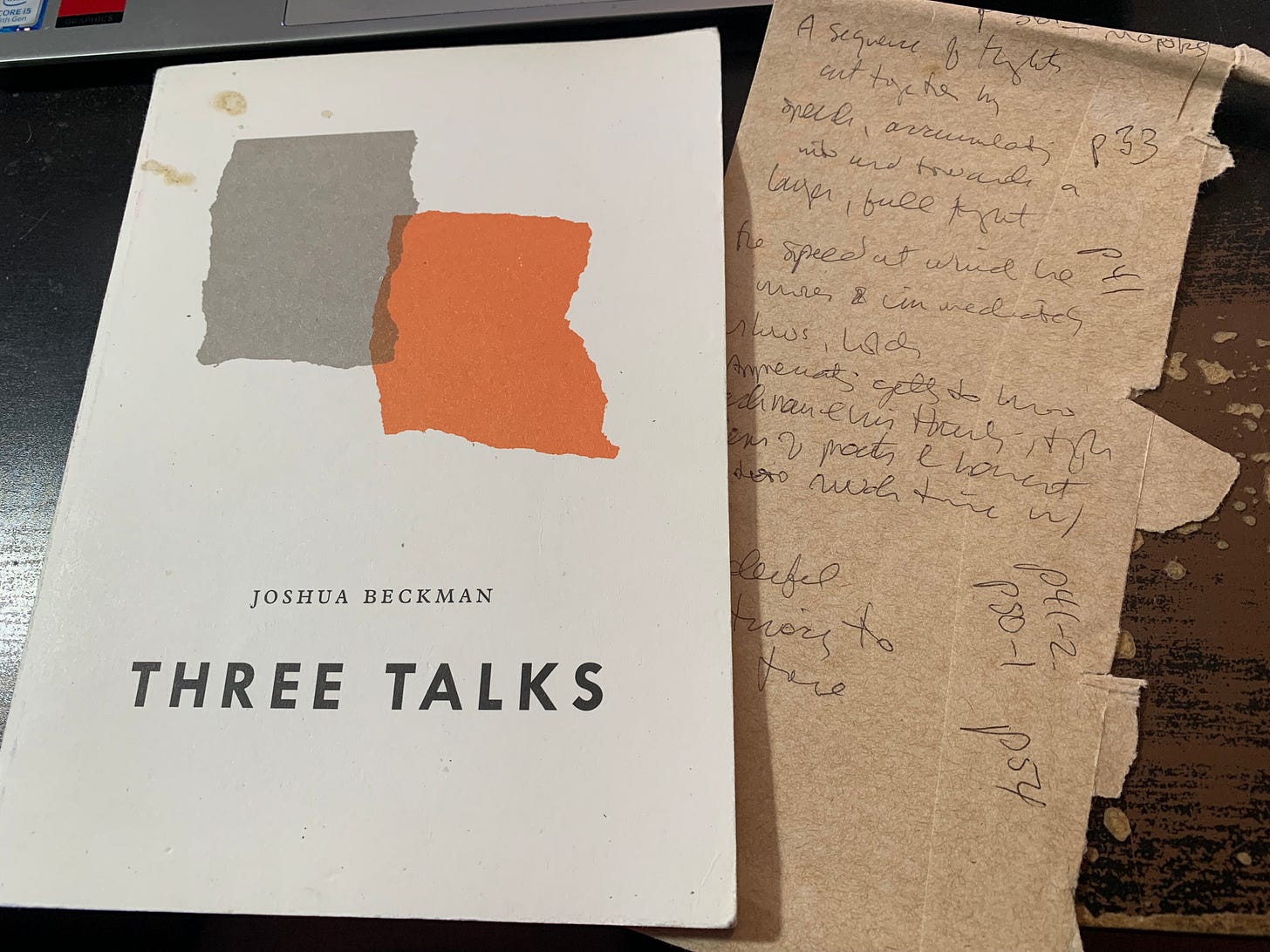Lecture for an Empty Room
in which I refer to Joshua Beckman for a second time,
As a poet you are endlessly asked to redescribe your process. As I grow older I seem to take more pleasure in this aspect. It’s as if you are issuing periodic weather reports on your process, and this goes on your entire career as a writer.
Cedar Sigo, “A Necessary Darkness: Barbara Guest and The Open
Chamber,” Guard the Mysteries (2021)
I’ve been writing and reviewing for so long that notetaking is a natural impulse. If a line or a thought strikes, I sketch it out so as not to lose it. My original notes on Joshua Beckman’s Three Talks (2018) were composed on the back of an empty University of Alberta Press envelope, slipped in as a bookmark and held in there, still. I must have been without my notebook when I first read this collection, providing instead a marginalia of paper scraps, being otherwise unable to mark up the pages of a printed book: names and page numbers scribbled down the length of repurposed paper. “P 9 – Creeley,” for example, or “P 30 – Monks.”
I never did manage a proper review. It was almost a book too big for my thinking, that I felt so deeply I didn’t know how to discuss. The intimacy and the wide range of quotations and thought, all curiously sweeping and swirling around each other in a casual, connected way. Although, must all responses be immediate? I’m currently in the midst of a similar conversation with Fort Collins, Colorado writer Katherine Indermaur’s I|I (2022), a stunning book-length lyric essay that writes across the fractal, offering an either/both/or through ways of seeing, looking and the mirror. “What good are surfaces?” she writes, early on in the collection. “Beyond touching, we want to push. We want to tear. Light, as particle and wave, spans both surface and depth. I|I peel back the periphery.”
My initial inclination is one of regret, in being unable to review such a striking book as Beckman’s, but have begun to understand just how much of my own thinking Beckman’s essays have generated, repeatedly offering me fresh considerations. It has evolved into a book I return to, to see what new elements it might spark or reveal. Is it selfish to move through writing as a prompt for my own practice? Or is this the very purpose of art, to prompt and push and allow for new perspectives? One of my notes on that stray envelope leads to this passage, near the end of the collection:
That, it seemed to me was the most obvious idea for a lecture on books. To display some part of my cosmos. What it is I bounce off of. And so I started to list and describe – books made privately and given as gifts, the book made from a diary that has the big present face of the author on its cover, the book of fragments gathered by one’s family, the pink-paged book with its musical notations, or the enormous book that expresses with its size the nature and depth, the vastness of its endeavor. The thin narrow book with its thin narrow poems. But the more I started to list and describe the more abstract they seemed, which made sense. When I’m not thinking about them, that’s exactly what they are – abstract presence of meaningful things.
As well, Three Talks was published as part of a pair, alongside Beckman’s The Lives of the Poems (2018), a book that took far too long to surface upon my shelves. Perhaps these compositions of mine broadcast not an argument for making, but my own inability to properly reshelve anything. The more I return to a particular title, the less likely I’m able to find it again. To put anything away properly, it might seem, is for me to be done with it.


